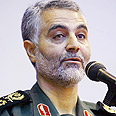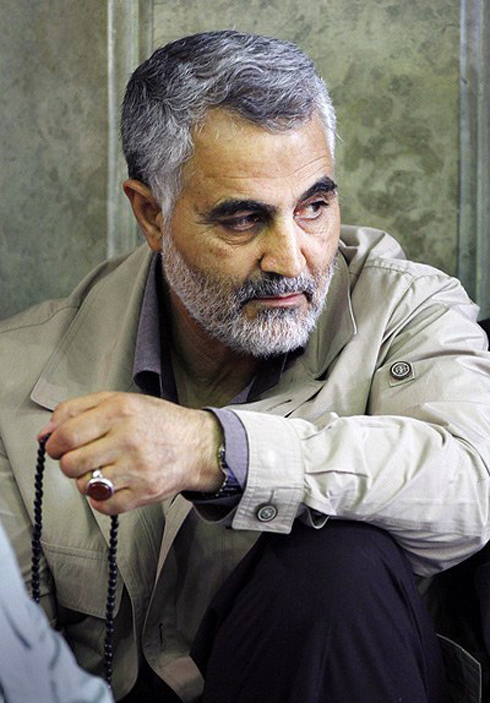
Who is the elite Iranian force behind arms transfers?
Quds Force and its leader Qasem Soleimani were dealt a blow when the Gaza-bound arms shipment was caught, and the incident is likely to further strain their relations with moderate President Rouhani who is trying to present a the world with a new Iran.
The capture of the Gaza-bound Iranian arms shipment by the IDF will not go unnoticed in the Islamic Republic, and is likely to strain relations between the moderates and conservatives vying for power in Tehran.
A senior IDF source explained that the IDF's Red Sea raid on the Klos C early Wednesday will further exacerbate the political conflict between moderate Iranian President Hassan Rouhani and hardliner Qasem Soleimani, who is the commander of the elite Quds Force, a division of the Iranian Revolutionary Guard.
See IDF animation explaining raid
"It is safe to assume," the IDF source explained, "that an in-depth investigation into Operation Full Disclosure is well underway in the Revolutionary Guard."
"Rouhani does not like such things," the military source said in reference to the attempt to transfer arms to the Gaza Strip, and thus, he explained, Rouhani "is trying to distance the Revolutionary Guard from decision-making positions."
Related stories:
- WATCH: IDF raid Gaza-bound Iranian arms shipment
- Zarif: 'Iranian ship capture' during AIPAC is no coincidence
- Behind the scenes of IDF 'Operation Full Disclosure'
Nonetheless, despite internal Iranian strife, the IDF does not believe that the Islamic republic will pull back attempts to arm terrorist groups in Lebanon and the Gaza Strip.
A senior official with the IDF Intelligence attempted to put the event into context, and explained that the Revolutionary Guard is walking a tightrope between preserving political stability within Iran and exporting its political agenda abroad.
"The Revolutionary Guard and the Iranian army are working together towards two goals: Internally, they are working to maintain the Ayatollah's regime. Externally, they are working to spread the 'revolution' throughout the world – from the Mideast, through Africa, South America, Afghanistan and Iraq. The latter is undertaken by the Quds Force, led by Soleimani."
The elite Quds Force was founded in 1990, and spearheaded Iran's overseas activities. The force is actively involved in covert operations against the US, Israel and pro-Western Arab states with the help of Iran's proxies like Hezbollah, while working to cover their tracks.
The attempt to transfer the advanced M-302 missiles to Gaza exemplified this mode of operation: The rockets were brought in from Syria, transferred on a ship traveling under Panama's flag and then, before beginning the journey to Gaza, made a stop in Iraq where they were further concealed in boxes marked as cement. Needless to say, the ship's official final destination – Port Sudan – was also an attempt to hide the weapons' true target – Gaza – which the shipment was supposed to reach via trucks.
Soleimani, who rarely makes public appearances or statements, is considered part of Iran's spiritual leader Ayatollah Ali Khamenei's inner circle and has led the force since 1998. Since he took the reigns, the Quds Force has grown from an elite unit numbering a few thousand of troops to a massive operation branch. Its men are placed in Iranian diplomatic missions around the world. The forces are also placed among NGOs as well as religious and educational facilities run by Iran.
The unit charged with international operations is called Special Operations Unit 400, and it answers directly to Soleimani and Khamenei.
Climbing ladders, no resistance
The IDF stopping the smuggling attempt also affected the organization that rules the Gaza Strip.
"Hamas is still in a bind and is carefully checking the mood in Iran, but is also being careful because reconnecting with Tehran would worsen their ties with Cairo further," the Israeli security sources.
In the Intelligence Corps this operation is one of dozens of operations or "mini-campaigns," that are underway at almost any given moment, against the spreading of Iranian terrorism, and against attempts to smuggle weapons through air, sea or land. Some of these campaigns work to stop or stall the Iranian nuclear program.
IDF Intelligence chief Gen. Aviv Kochavi refused, as expected, to give away the intelligence tip that started Operation Full Disclosure, but hinted that "the rockets' transfer in planes from Damascus to Tehran sparked the process."
He stressed that "we have strong evidence that strengthens Iran's ties to the case and incriminates it. Iran's Revolutionary Guard and its Quds Force ran the smuggling operation."
IDF Intelligence estimates that the Iranians will not try to avenge the thwarting of the smuggling attempt, but it is definitely safe to assume that they will have an in-depth investigation into the failed operation and learn the lessons ahead of future smuggling attempts.
Additional details of the takeover were released by the IDF Thursday. A senior Navy official said the ship's Turkish captain was surprised to receive a call on the ship's radio from the Israeli Navy commandos, who asked him to stop the boat and told him they intended to board the ship.
"It took him a few minutes to response, but when he was standing on the bridge, looking left and right and seeing two missile boats standing by with more boats filled with commandos ready to go, he gave us permission to come aboard," the official said.
"We quickly made it clear to him that we were not pirates and that we belong to the Israeli Defense Force and want to search his ship," he said.
"We started searching through some of the containers that were crowded in the belly of the ship, which forced us to open the containers from the side by sawing through them. When we moved the bags of cement away and opened the boxes that contained the rockets, we brought the captain down there and only then did he realize he was fooled," the official continued. "At this point he described the ship's entire course so far in Turkish and in English and realized he had become a victim of an Iranian conspiracy."
The official noted the captain and his crew did not protest the Navy's search, "because they saw the kind of military might that was around them, among other reasons."
"At the same time, we held a maneuver in the area, where many trading boats pass, in order to make it clear that we do not intend to attack them as well," he added.












